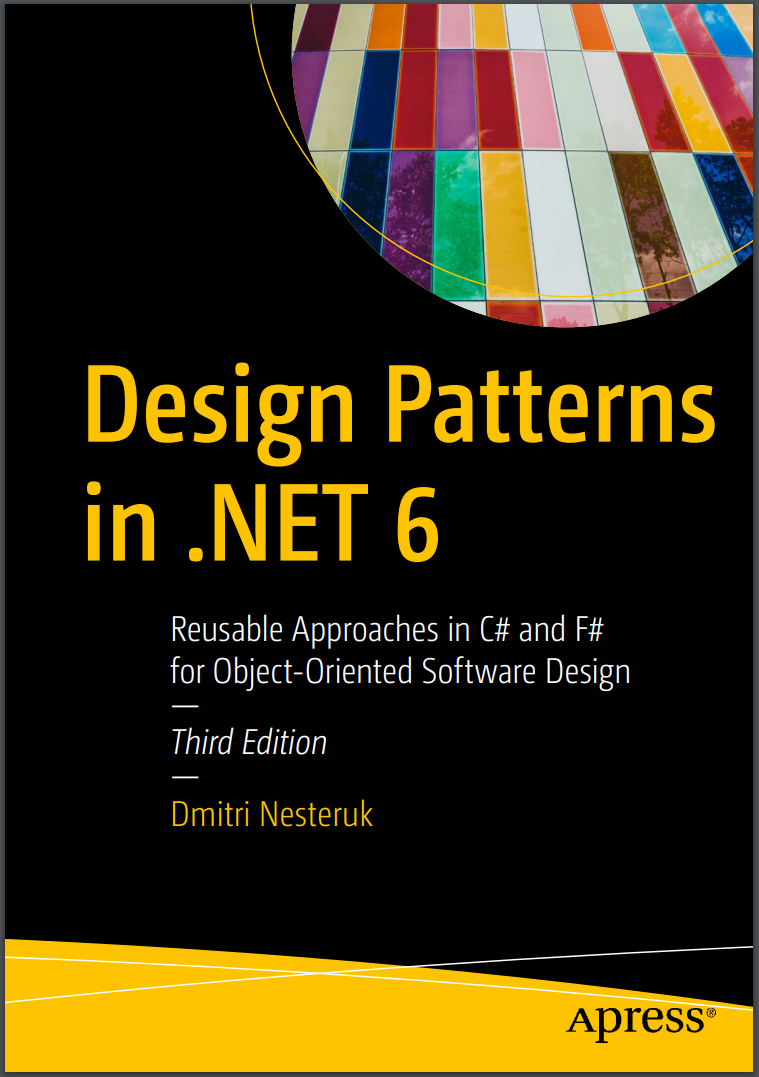F#

Design Patterns in .NET 6. 3 Ed - Dmitri Nesteruk
Implement design patterns in .NET 6 using the latest versions of the C# and F# languages. This book provides a comprehensive overview of the field of design patterns as they are used in today’s developer toolbox. In addition to the functional builder, asynchronous factory method, generic value adapter, and composite proxies, this new edition introduces topics such as Decorator Cycle Policies Functional Commands, a Transformer variation of the Visitor pattern, and factories that can perform Object Tracking and Bulk Replacement.
Using the C# and F# programming languages, Design Patterns in .NET 6 explores the classic design pattern implementations and discusses the applicability and relevance of specific language features for implementing patterns. You will learn by example, reviewing scenarios where patterns are applicable. Former C# MVP and patterns expert Dmitri Nesteruk demonstrates possible implementations of patterns, discusses alternatives and pattern relationships, and illustrates the way that a dedicated refactoring tool (JetBrains Rider) can be used to implement design patterns with ease.
What You Will Learn
- Become familiar with the latest pattern implementations available in C# 10 and F# 6
- Know how to better reason about software architecture
- Understand the process of refactoring code to patterns
- Refer to researched and proven variations of patterns
- Study complete, self-contained examples, including many that cover advanced scenarios
- Use the latest versions of C# and Visual Studio/Rider/ReSharper
Who This Book Is For
Developers who have some experience in the C# language and want to expand their comprehension of the art of programming by leveraging design approaches to solve modern problems.
/get_programming_with_f_abraham_2018.jpg)
Get programming with F# - Isaac Abraham
This book takes a practical look at how to start using functional programming techniques with F# in production applications, using frameworks, libraries, and tools that you’re already familiar with, as well as exploring F#-specific libraries that open up all sorts of interesting options that aren’t possible today in C# and VB .NET.
It’s important to note from the outset that this book won’t teach you everything about the F# language. Instead, we’ll focus on a core subset of the language that gives you the most effective return for your investment; where there’s further learning available that could be worthwhile for you, I’ll point it out. You won’t learn everything about functional programming, either; again, we’ll concentrate on the most important fundamentals from which the more advanced techniques and practices will naturally reveal themselves to you over time. So, if you’re expecting to learn the ins and outs of functors, monads, and applicatives, this book isn’t for you. If, on the other hand, you want to learn the parts that will enable you to achieve the same qualities in software that you strive for already, without spending time learning the inner workings of exactly why things work from a theoretical point of view, then keep reading!
If you’re an enterprise developer on .NET, it’s likely that you’re looking to see how F# can provide tangible benefits to you in the minimum amount of time. This book focuses on showing you things that you can start using today with F#, be they frameworks that you might already know, or F#-specific libraries designed to take full advantage of F#’s powerful type system that will provide real-world benefits over existing libraries. As such, this book focuses on using Visual Studio on Windows as the primary development platform, although you can use almost (but not all) of the libraries mentioned here through other IDEs and OSs.
/stylish_f_eason_2018.jpg)
Stylish F# - Kit Eason
There are three distinct philosophies that you can apply to computer programming. You can think of programming as a science, where the measure of progress is how well you discover and reflect fundamental mathematical concepts in your code. You can think of it as a discipline, where you seek to establish and follow rules about how code should be written and organized. Or, best of all, you can think of it as a craft, where, yes, you apply some of the science and some of the discipline; but you leaven those with a generous helping of human creativity. To do this successfully, you need a fair bit of experience, because crafting something is an inherently intuitive process. This book aims to get you to a level where you can craft code confidently. It does this by distilling and passing on my own experience of writing F# systems in numerous different industries over the past eight years.
Before you start this book, you’ll need at least some knowledge of F# syntax and concepts. Maybe you’ve read some of the wide range of beginner material that’s available, and probably you’ll have written at least a few simple F# programs yourself. You may well have deeper experience of other languages and environments, such as C# and .NET. That said, I have framed the book so that C# knowledge is not a hard prerequisite: I learned F# before I learned C#, and if I can do it, so can you! Also you definitely don’t need any background in Computer Science or functional programming. I don’t have even a trace of formal education in either of these areas.